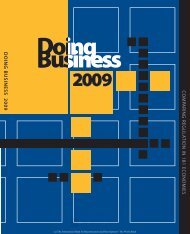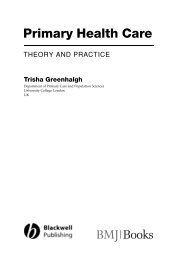Download File - JOHN J. HADDAD, Ph.D.
Download File - JOHN J. HADDAD, Ph.D.
Download File - JOHN J. HADDAD, Ph.D.
Create successful ePaper yourself
Turn your PDF publications into a flip-book with our unique Google optimized e-Paper software.
Factoring in Antigen Processing in Designing Antitumor T-Cell Vaccines 25<br />
67. Deussing J, Roth W, Saftig P, et al. Cathepsins B and D are dispensable for major<br />
histocompatibility complex class II-mediated antigen presentation. Proc Natl Acad<br />
Sci USA 1998; 95:4516–4521.<br />
68. Hsing LC, Rudensky AY. The lysosomal cysteine proteases in MHC class II antigen<br />
presentation. Immunol Rev 2005; 207:229–241.<br />
69. Manoury B, Hewitt EW, Morrice N, et al. An asparaginyl endopeptidase processes a<br />
microbial antigen for class II MHC presentation. Nature 1998; 396:695–699.<br />
70. Mathieu MA, Bogyo M, Caffrey CR, et al. Substrate specificity of schistosome<br />
versus human legumain determined by P1-P3 peptide libraries. Mol Biochem<br />
Parasitol 2002; 121:99–105.<br />
71. Maehr R, Hang HC, Mintern JD, et al. Asparagine endopeptidase is not essential for<br />
class II MHC antigen presentation but is required for processing of cathepsin L in<br />
mice. J Immunol 2005; 174:7066–7074.<br />
72. Shirahama-Noda K, Yamamoto A, Sugihara K, et al. Biosynthetic processing of<br />
cathepsins and lysosomal degradation are abolished in asparaginyl endopeptidasedeficient<br />
mice. J Biol Chem 2003; 278:33194–33199.<br />
73. Hsieh C-S, de Roos P, Honey K, et al. A role for cathepsin L and cathepsin S in<br />
peptide generation for MHC class II presentation. J Immunol 2002; 168:2618–2625.<br />
74. Manoury B, Mazzeo D, Fugger L, et al. Destructive processing by asparagine<br />
endopeptidase limits presentation of a dominant T cell epitope in MBP. Nat Immunol<br />
2002; 3:169–174.<br />
75. Moss CX, Villadangos JA, Colin Watts C. Destructive potential of the aspartyl<br />
protease cathepsin D in MHC class II-restricted antigen processing. Eur J Immunol<br />
2005; 35:3442–3451.<br />
76. Musson JA, Walker N, Flick-Smith H, et al. Differential processing of CD4 T-cell<br />
epitopes from the protective antigen of Bacillus anthracis. J Biol Chem 2003;<br />
278:52425–52431.<br />
77. Musson JA, Morton M, Walker N, et al. Sequential proteolytic processing of the<br />
capsular Caf1 antigen of Yersinia pestis for major histocompatibility complex class<br />
II-restricted presentation to T lymphocytes. J Biol Chem 2006; 281:26129–26135.<br />
78. Maric M, Arunachalam B, <strong>Ph</strong>an UT, et al. Defective antigen processing in GILTfree<br />
mice. Science 2001; 294:1361–1365.<br />
79. Hastings KT, Lackman RL, Cresswell P. Functional requirements for the lysosomal<br />
thiol reductase GILT in MHC class II-restricted antigen processing. J Immunol<br />
2006; 177:8569–8577.<br />
80. Haque MA, Li P, Jackson SK, et al. Absence of g-Interferon-inducible lysosomal<br />
thiol reductase in melanomas disrupts T cell recognition of select immunodominant<br />
epitopes. J Exp Med 2002; 195:1267–1277.<br />
81. Lovitch SB, Unanue ER. Conformational isomers of a peptide-class II major histocompatibility<br />
complex. Immunol Rev 2005; 207:293–313.<br />
82. Lovitch SB, Esparza TJ, Schweitzer G, et al. Activation of type B T cells after<br />
protein immunization reveals novel pathways of in vivo presentation of peptides.<br />
J Immunol 2007; 178:122–133.<br />
83. Viner N, Nelson C, Unanue E. Identification of a major I-E k -restricted determinant<br />
of hen egg lysozyme: limitations of lymph node proliferation studies in<br />
defining immunodominance and crypticity. Proc Natl Acad Sci USA 1995;<br />
92:2214–2218.

















